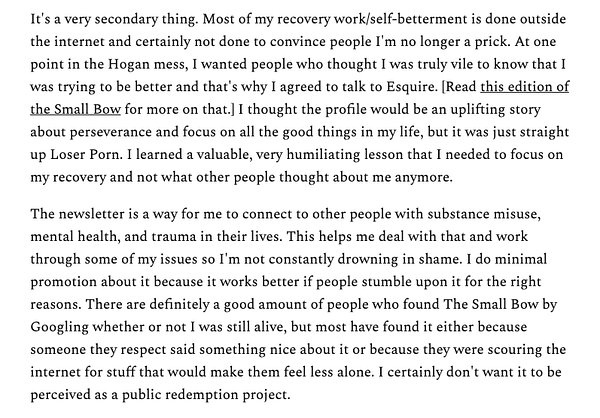Our Weekly Discontents: August 24, 2020
Good luck to them and good luck to us and good luck to everyone

You sure do see more newsletters nowadays than you used to. Another thing I see a lot of on Twitter or wherever is someone will go haha they should collect all these newsletters in one place and charge one subscription price for it and accidentally reinvent the magazine and then some other guy will go haha and it’s a great bit you have to agree. That’s not entirely what we’re doing here at Discontents but it’s also not entirely not that either so let’s see how it goes!
One thing is clear which is that the days of writers cobbling together a living at like $150-300 a pop for articles that you have to wait 19 months to ever get paid for are over. The publications that are even left in business at this point tried foisting that model on us for years and we all went along with it because we had no other choice but now we do so good luck to them and good luck to us and good luck to everyone.
It’s Luke from Welcome to Hell World by the way. Hello.
A few months back I had two really idiotic thoughts one of which was that there would surely come some threshold of widespread unnecessary death after which everyone would finally at long last start taking the pandemic seriously. Perhaps it would be 100,000 dead I thought and I was surely fucking stupid to think that in retrospect. I wonder if a million would do it?
The other thing I thought and yes I know was that police might think to themselves they would go hm maybe we should stop brutalizing and killing people on camera if only just for a little while until everyone stops focusing on us. Even just as a cynical ploy to get people off their backs I thought but no once again I was a complete dumb shit because that’s a big part of the job for them after all being able to do the violence without consequences.
Rest in peace to Justin Townes Earle. He was 38.
Ok here’s the rest of the gang.

A Lonely Impulse of Delight
Last week, I made a solemn confession: I am That Guy in Your MFA (you know the one). I think the piece went over well—in addition to my beloved subscribers, a few people in my program read it and seem to have enjoyed it. But there are downsides to being That Guy. Quite a few people I know are still processing that shower curtain pic. If you ask me, a lot of what’s wrong with the United States can be summed up in the way an enterprising youngish artist gets shamed for his ingenuity. This country used to have a can-do spirit. Now we do everything for Instagram and TikTok and what-have-you.
I’m gonna keep teasing this for a while, but I’m starting the slow process of figuring out what to offer as premium content. I do want to try serializing a novel, but I have all the fears you’d expect about running out of gas—or just writing a bad book. Whatever shape paywalled content ultimately takes in my newsletter, it’ll be an experiment, one that will benefit a tremendous amount from reader input. So please, if my work interests you at all—I range widely—sign up, and let’s figure this out together. I want A Lonely Impulse of Delight to live up to its name: A reflective, critical delight in the midst of, shall we say, trying times. I want this to be fun without being completely frivolous. It’ll all be so much better with your readership and your insights.
Be The Spark
This week, I had intended to make a quick post about a recent essay I’d had published on Allure, and how scary and invigorating it had been to use photos of myself for the cover art… but a noxious reply guy derailed that plan, and instead, I ended up writing out a longer series of thoughts about disability, cruelty, and what it’s like to go through life being told that you look like an alien.
Wars of Future Past
It’s something of a footnote in my latest newsletter, but I cannot stop thinking about a story I read in July about people traveling to tidal pools in California to essentially forage for a free meal of ocean game. My published work this past week has been about collapse, recovery, and what it means when people transition between the two. Humans are, fundamentally, survival machines.
There’s a person quoted at the tidal pool, who normally makes her living dealing blackjack at a casino. In pre-pandemic times, that meant a casino found it profitable enough to keep her around to oversee card games, with profit skimmed from everyone drifting in for a shot at the pool, and this in turn allowed the dealer to provide for herself and her people. With the great abandonment of the shared indoors in the pandemic, every removed step from food production is gone, and so it’s off to the tide pools with a bucket to quell a rumbling stomach.
In the midst of this, the state will endure. It has enough money to plunk a million at a time on military AI projects, automating victory in games as a way to get to victory in future wars. A million dollars is a rounding error of a rounding error of a rounding error in Pentagon budgeting, and it’s also enough to cover 17 people at just below the US median income for a year. In the next issue of Wars of Future Past, expect a deeper dive into what policy makers can learn from military AI, and especially, what they can’t.
Foreign Exchanges
Hello friends, Derek here. This week at Foreign Exchanges our big story was the military coup in Mali. On Tuesday, soldiers from a military base in the town of Kati mutinied, then made their way to the capital city of Bamako where they arrested President Ibrahim Boubacar Keïta and forced him to dissolve parliament and resign. The coup leaders, who are calling themselves the “National Committee for the Salvation of the People,” said they were working with Mali’s civilian political opposition and would hold new elections soon. But on Sunday they released a more detailed political plan that calls for three years of military rule followed by a (very hypothetical) transition back to civilian rule. So not that soon.
Military coups aren’t always well received by the public, but by all appearances this one has been. There have been celebrations on the streets of Bamako and little indication of a negative response outside the capital. In contrast, the international condemnation has been thorough, from the regional ECOWAS bloc to the African Union to the United Nations and beyond. Keïta is typical of the kind of developing world head of state who is liked by his peers and by Western governments because he keeps things stable for all the right interests. It doesn’t matter to them that he’s failed to improve the Malian economy and failed to contain the Islamist violence that is a daily fact of life in Mali. But those things do matter to the Malian people, and anger over those issues as well as over the Malian Constitutional Court’s interference in this year’s parliamentary election sparked a sustained protest movement that left Keïta deeply unpopular and very vulnerable to challenge.
Air Gordon pt. 2
I apologize, friends. When I started my blog, my intention was to write about once a week, or every two weeks at the most, but here we are at the end of August and it’s looking like I won’t publish again until September. I lay most of that at the hands of my apartment move, which has sucked up most of my mental and physical energy in the last few weeks, along with some freelance assignments that took up my time in the interim. Last week I published two things: a chat with Conor Oberst about what he’s been consuming in quarantine for The New York Times, and a review of Benjamin Nugent’s Fraternity for The Baffler.
A short thought on the former. Talking to Oberst was, in a very nerdy and earnest way, a small bucket list item; I’ve been listening to Bright Eyes for 15+ years and while I couldn’t sincerely say they’re one of my “favorite” bands, I have specific and deep feelings associated with I’m Wide Awake, It’s Morning that are not replicated by bands I technically like more. A funny thing he said during our chat, which stretched for two hours and covered lots of things not mentioned in the piece, was that he writes “dope songs.” I was very tickled by the verbiage — one of the most acclaimed songwriters of the last two decades, a man praised time and time again for the literary and emotional bent of his lyrics, simply referring to them as “dope,” in the only part of the conversation where he directly talked about his music. Something I’ve noticed from the musicians I’ve interviewed is that they really do think about their work in those visceral terms — dope songs, sick tracks, music that kicks ass, etc — even though there’s so much more work that goes into their creation, because at the end of the day the root reaction is what matters most. Oberst does write dope songs, if you’re into that. It’s important to remember, when thinking about what artists might want to do for us.
Discourse Blog
It’s Jack Crosbie from Discourse Blog again. Some highlights from this week: Sam Grasso used her own complicated relationship with her racial identity to explain the exhausting conversation around Kamala Harris’s race. I wrote about the weird slacktivism of telling people to “Vote”, and Katherine Krueger ranked the DNC’s surreal roll call votes by David Lynchian-ness.
As always, our editor Jack M. has a great breakdown of what you missed behind the paywall, including Paul Blest’s essay about Steve Bannon being kind of a moron and his own essay about the Democratic establishment re-asserting itself. Also, Sam has put a ton of work into our Instagram, where we’re doing visuals and pulls from our best stories that you can repost or share through there as well. Check it out! Drop a follow!
BORDER/LINES
It’s never been easy to get asylum in the United States. Even under the best political circumstances, you have to convince a judge you’ve faced persecution in your home country due to a very narrow set of reasons, and unless you can come up with thousands of dollars or find a pro-bono lawyer willing to take your case, you have to do it without legal help.
In recent years, the process of getting asylum has become virtually impossible. A new Trump administration proposal could add yet another obstacle. Last week, we looked at a new policy that, using the coronavirus pandemic as a justification, would immediately deport most migrants. We also broke down other recent attacks on asylum, most of which haven’t garnered the same outrage as the 2018 family separation policy.
Welcome to Hell World
Both of my pieces this week were for paying subscribers only but you can get a taste of them in this free digest. The first was about among other things a recent CDC report on the effects the pandemic has had on people’s behavioral and mental health.
“Overall, 40.9% of respondents reported at least one adverse mental or behavioral health condition, including symptoms of anxiety disorder or depressive disorder (30.9%), symptoms of a trauma- and stressor-related disorder related to the pandemic (26.3%), and having started or increased substance use to cope with stress or emotions related to COVID-19 (13.3%),” the report explains and that seems alarming sure but it also seems a little low right?
Speaking of substance abuse I also caught up with former Gawker editor A.J. Daulerio on the occasion of the anniversary of the site’s last post which came four years ago this week.
If you followed the story or were a fan or critic of Gawker you probably remember what happened. Hulk Hogan’s Peter Thiel-funded lawsuit sent the once feared and beloved company into a spiral that it never fully recovered from, and laid out a path for vindictive billionaires to fuck with media they don’t like going forward.
The fallout made clear to Daulerio all of the ways that his life had already been in ruins, even before the trial, with a subsequent comeuppance that many think was well-earned.
In a lot of ways it all seems to have saved his life too. “I had to acknowledge that my life was already pretty bad — I was already unemployable, broke, and unstable before Hogan came in and blew it up. It took a little while for me to realize that, but that's really what changed for me is I stopped blaming the trial for ‘ruining’ shit and began to see it as a real opportunity to change,” he told me.
Four years on Daulerio is clean and sober and his newsletter The Small Bow has become a lovely community of people in recovery.
Read the full interview here. Here’s a 20% off discount for a subscription if you’d like to try it out.




Cruel and Usual
I used my newsletter this week to recommend a piece by Elon Green over at the Appeal about the incredible whiteness of the true crime genre. I’ve always been sort of annoyed by true crime, although I was never really able to pull my annoyance into a cohesive critique like Green does. After reading the Appeal piece, the one thing I have to add is that I really despise the way in which a lot of true crime stories focus on the binary: guilty/innocent, good/evil. There are two essential problems with this: it builds crime up to be about morals, when in fact most crime in America is about a socially constructed hierarchy of race and class. It also, for the sake of narrative, often ignores that there are real problems with constructing a “truth” of what happened in the past from fragments in the present. That is especially true when those tasked with collecting those fragments are often more concerned with a truthiness that maintains the aforementioned social hierarchy than actual truth.
Perspectives: Past, Present, and Future
Nothing new from me (Patrick Wyman) this week — I’m dealing with the fallout from a 400-mile move, two small children, and trying to enjoy a long-delayed vacation — but here are a few things that might interest you: a summary of the most recent archaeological and genetic research on the earliest inhabitants of the Americas, and a primer on what institutions are, how they function, and why they matter.
The Insurgents
This week we’re joined by Manny Fidel of Business Insider. We talk about the Dem Convention and its focus on aesthetics over substance, and also how we couldn’t help but notice the curious phenomenon that the famed Democratic Party Big Tent that we always hear about only ever seems to extend in one direction. Manny also breaks down his column in Insider about how progressives are grappling with the Biden nomination. There’s some talk in here also about sports returning and the Dem leadership’s efforts to prolong fossil fuel subsidies.

Ok goodbye for now.



